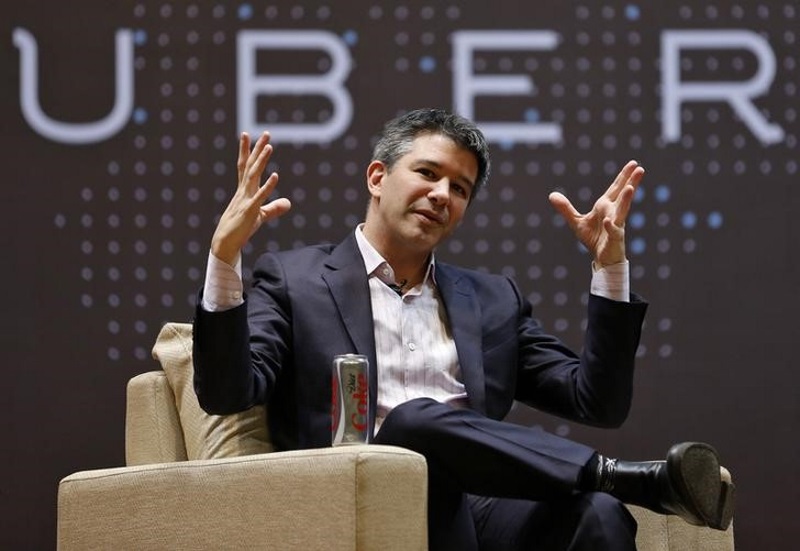Uber Could Double Investment in India if Returns Are Good, Says CEO

"If we see five times the return on our spending, we would spend $2 billion (roughly Rs. 13,600 crores) instead of $1 billion (roughly Rs. 6,800 crores) that we have committed to spending on the India business," Kalanick said in Mumbai, addressing aspiring entrepreneurs at the IIT Bombay campus.
"The economy in India has really been flourishing in a big way in the last decade. I expect so much of big growth ahead, and at a scale. By 2020 there will be 1 billion smartphone users here, and I'm excited about that," he said.
"In January this year, Uber has a marketshare of about 40 percent (in India), from 4 percent in January last year. In three of the top five cities here, more than 50 percent of citizens prefer Uber," he added.
(Also see: Uber's Kalanick: India's Payment System Prompted a Change in Operations)
When Uber came to India three years ago, lack of financial instruments was the biggest challenge, people didn't have cards, there weren't enough cars, or smartphone users, he said. "But all that is changing so fast."
Kalanick sees India and especially Bengaluru as a top research and innovation hub. "I've been to many cities and I always refer to the three 'bays'. The Bay Area, Beijing and Bengaluru, that will be in the forefront."
The startup ecosystem in the country has grown up in the last 10 years, and the funding environment has gone global, he said, adding "we now have global investors whose main thing is to invest in India".
Speaking about deep discounting practises followed by many e-commerce companies, he said that subsidies and large burning of cash is a "Chinese invention".
"It's a pretty interesting innovation that I had to learn about, I know how to build profitable businesses but China is fiercely competitive. In some ways India is going that way.
"In order to compete, you have to do it, but I make sure that I spend my investments more efficiently. I don't have to spend money if there is no return on investment on it."
One of Uber's top cultural values was to "always be hustling", and it roughly translates to "jugaad" in India, he said. "We follow the always be jugaad-ing model here....On a serious note, it's about making it work with limited resources," he said.
Catch the latest from the Consumer Electronics Show on Gadgets 360, at our CES 2026 hub.
Related Stories
- Samsung Galaxy Unpacked 2025
- ChatGPT
- Redmi Note 14 Pro+
- iPhone 16
- Apple Vision Pro
- Oneplus 12
- OnePlus Nord CE 3 Lite 5G
- iPhone 13
- Xiaomi 14 Pro
- Oppo Find N3
- Tecno Spark Go (2023)
- Realme V30
- Best Phones Under 25000
- Samsung Galaxy S24 Series
- Cryptocurrency
- iQoo 12
- Samsung Galaxy S24 Ultra
- Giottus
- Samsung Galaxy Z Flip 5
- Apple 'Scary Fast'
- Housefull 5
- GoPro Hero 12 Black Review
- Invincible Season 2
- JioGlass
- HD Ready TV
- Laptop Under 50000
- Smartwatch Under 10000
- Latest Mobile Phones
- Compare Phones
- Samsung Galaxy A07 5G
- Vivo Y500i
- OnePlus Turbo 6V
- OnePlus Turbo 6
- Itel Zeno 20 Max
- OPPO Reno 15 Pro Mini 5G
- Poco M8 Pro 5G
- Motorola Signature
- Lenovo Yoga Slim 7x (2025)
- Lenovo Yoga Slim 7a
- Realme Pad 3
- OPPO Pad Air 5
- NoiseFit Pro 6R
- Xiaomi Watch 5
- Acerpure Nitro Z Series 100-inch QLED TV
- Samsung 43 Inch LED Ultra HD (4K) Smart TV (UA43UE81AFULXL)
- Asus ROG Ally
- Nintendo Switch Lite
- Haier 1.6 Ton 5 Star Inverter Split AC (HSU19G-MZAID5BN-INV)
- Haier 1.6 Ton 5 Star Inverter Split AC (HSU19G-MZAIM5BN-INV)

















